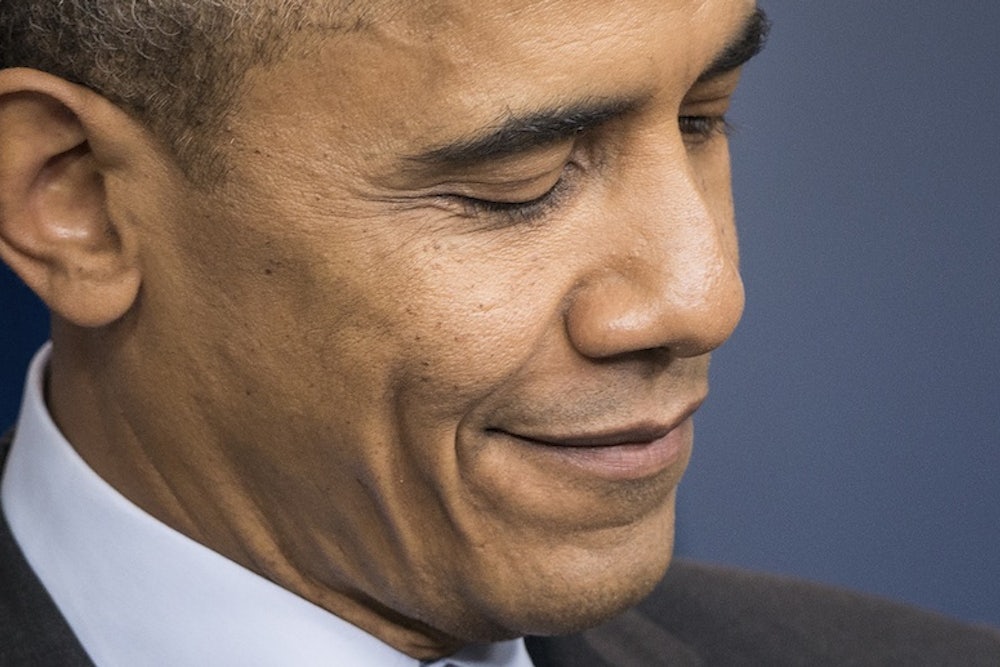It’s been a pretty good week for the Obama administration. The bungled healthcare.gov Web site emerged vastly improved following an intensive fix-it push, allowing some 25,000 to sign up per day, as many as signed up in all of October. Paul Ryan and Patty Murray inched toward a modest budget agreement. This morning came a remarkably solid jobs report, showing 203,000 new positions created in November, the unemployment rate falling to 7 percent for the first time in five years, and the labor force participation rate ticking back upward. Meanwhile, the administration’s push for a historic nuclear settlement with Iran continued apace.
All of these developments are tenuous. The Web site’s back-end troubles could still pose big problems (though word is they are rapidly improving, too) and the delay in getting the site up working leaves little time to meet enrollment goals. Job growth could easily stutter out again. The Iran deal could founder amid resistance from Congress or our allies.
Still, it seems safe to say that the Obama presidency is not, in fact, over and done with. What, you say, was there any question of that? Well, yes, there was – less than a month ago. On November 14, the New York Times raised the “K” word in a front-page headline:
President Obama is now threatened by a similar toxic mix. The disastrous rollout of his health care law not only threatens the rest of his agenda but also raises questions about his competence in the same way that the Bush administration’s botched response to Hurricane Katrina undermined any semblance of Republican efficiency.
A day later, Dana Milbank gave an even blunter declaration of doom in the Washington Post:
There may well be enough time to salvage Obamacare.
But on the broader question of whether Obama can rebuild an effective presidency after this debacle, it’s starting to look as if it may be game over.
And Ron Fournier, the same week, explained in National Journal that things were so grim for Obama because his presidency had reached a kind of metaphysical breaking point:
Americans told President Obama in 2012, "If you like your popularity, you can keep it."
We lied.
Well, at least we didn't tell him the whole truth. What we meant to say was that Obama could keep the support of a majority of Americans unless he broke our trust. Throughout his first term, even as his job-approval rating cycled up and down, one thing remained constant: Polls showed that most Americans trusted Obama.
As they say in Washington, that is no longer operable.
Granted, finding overwrought punditry in Washington is about as difficult as hunting for game at one of Dick Cheney’s favorite preserves. Making grand declarations based on the vibrations of the moment is part of the pundit’s job description, and every political writer with any gumption is going to find himself or herself out on the wrong limb every once in a while. That said, this has been an especially inglorious stretch for Beltway hyperventilators. First came the government shutdown and the ensuing declamations about the crack-up of the Republican Party. Then, with whiplash force, came the obituaries for the Obama presidency. The Washington press corps has been reduced to the state of the tennis-watching kittens in this video, with the generic congressional ballot surveys playing the part of the ball flitting back and forth.
What explains for this even-worse-than-usual excitability? Much of it has to do with the age-old who’s-up-who’s down, permanent-campaign tendencies of the political media, exacerbated by a profusion of polling, daily tipsheets and Twitter. Overlaid on this is our obsession with the presidency, which leads us both to inflate the aura of the office and to view periods of tribulation as some sort of existential collapse. Add in the tendencies of even more serious reporters to get into a chew-toy mode with tales of scandal or policy dysfunction, as happened with the healthcare.gov debacle – the media has been so busy hyping every last aspect of the rollout’s woes that it did indeed start to seem inconceivable that things might get better soon.
But things did get better, as one should have been able to anticipate, given the resources and pressure that were belatedly brought to bear on the challenge. The fiasco took a real toll on the law and on the liberal project, for which Barack Obama bears real responsibility. But the end of a presidency? Take a deep breath, folks.
The sad thing about this spectacle isn't even the predictable display of presentism. It's the evident ignorance of the constitution and the basics of American politics. For the next three years, Obama will occupy the presidency, a position that comes with remarkable legal powers, especially now that he's been partly liberated from the filibuster's constraints. Washington columnists—the folks who presumably get paid to disseminate this kind of wisdom to the rubes beyond the Beltway—ought to know this better than anyone else, yet even as they fixate so much on the office's aura, they are awfully quick to declare an administration defunct. News happens, and in the Oval Office, or the House majority, you always have the ability to influence it, even when you don't deserve it. Kind of like certain well-known writers I could name.
